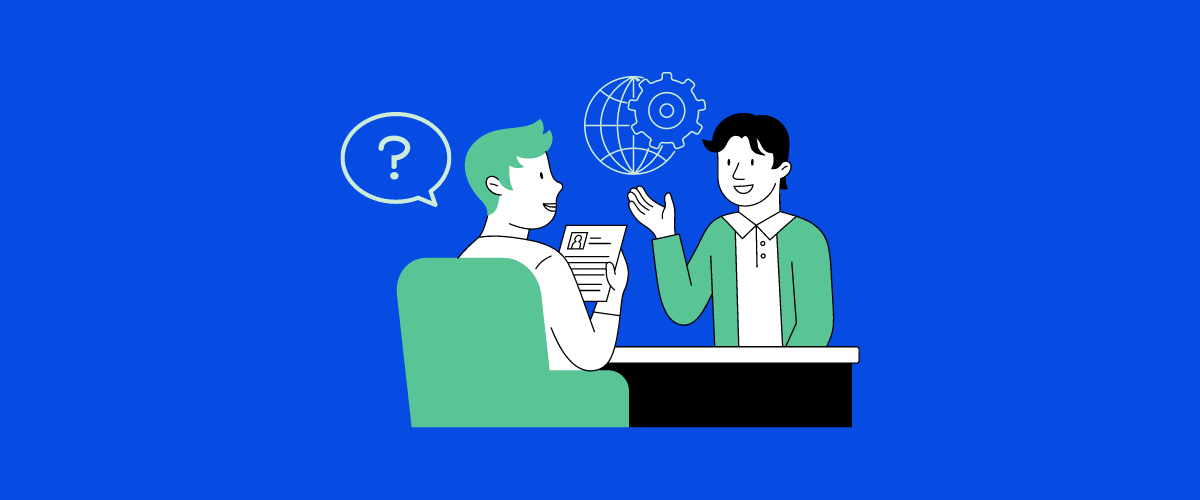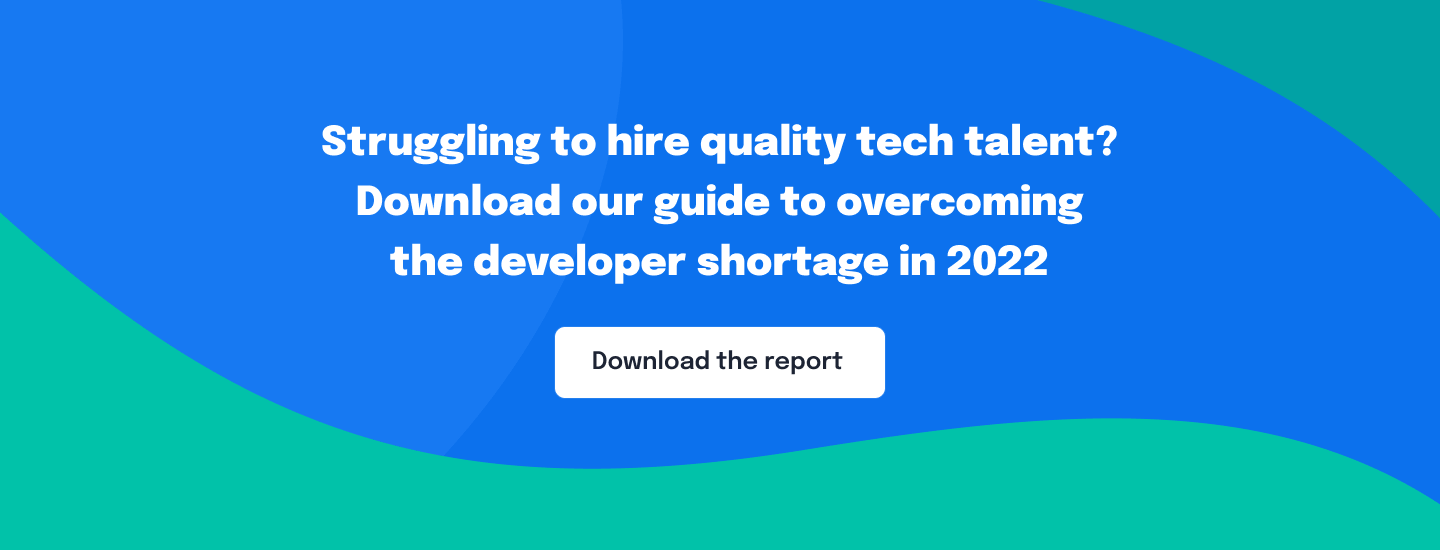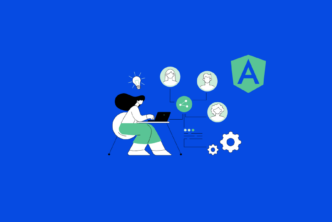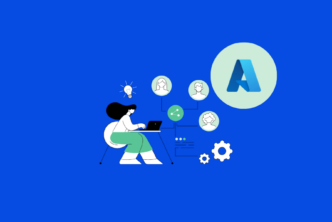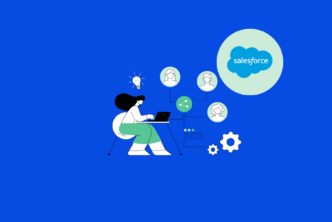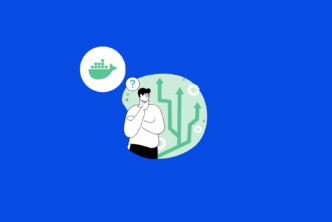Research shows that 38 % of visitors will leave a website in case of unattractive layout or content. That’s why professional web developers are still in high demand as of 2022. However, it’s not that easy to find and hire a really professional one.
A great web developer is someone who not only writes the code but also clearly understands the project requirements and studies the target audience of the company and its product.
In this article, we’re going to list the questions related to your project that you should ask yourself before you hire web developers.
We’ll also provide some sample interview questions that may help you make the right decision.
Questions to ask yourself
If you own a well-established business and would like to modernize the outdated company website, then it’ll be easier for you to cooperate with the newly hired web developers.
But what if you are a startup founder and would like to build a website from scratch? Are you 100% aware of your product’s target audience, the market that you’re going to enter, the budget, and so on? If not, then don’t expect that your web developers for hire will not know that.
Before you hire web developers to create a website for your company or project, it’s crucial that you know the goals and requirements for your project. Here are some questions to ask yourself that can help you move in the right direction.
#1: What is the target audience of your product?
You must be quite precise when it comes to defining the target audience, i.e. people that will be using or consuming your product. You must know everything about them, including their age, gender, location, occupation, hobbies, etc. This requires deep research of the market.
When you know who’ll be using your product, you’ll have an idea of what a website should look like. Will it be modern and low key for hipster millennials or classic and sleek for members of large corporations?
Identify your target audience – and you will find out the answer.
#2: Why do you need a website?
“Because everyone has a website” or “To get more customers” are wrong answers. Just like you pitch your startup to investors and state the problem that it may fix, you must identify the challenge that will be solved with your website. For example, “To target the millennials” or “To be able to sell our products to people who live far from a store location.”
#3: From where will you be getting your clients?
Will your clients come from personal referrals or advertising? Which role will the ads be playing in your success? Which advertising media will work best for them? Are you active on social media? Answers to these questions will help you find out the main sources of your client traffic and steer your product marketing efforts in the right direction.
#4: What is your budget?
If you have a limited budget and cannot afford to pay big amounts – don’t give up, as there’s a solution. Actually, you can get a high-quality website at a reasonable price if you hire freelance web developer talent from an offshore country.
Low costs offered by the freelancers don’t necessarily mean that you’ll get mediocre quality of work delivered and are caused by the lower cost of living in offshore countries.
However, be sure to read the feedback written by previous clients and study the freelancer’s rating at the portal such as Upwork or other alternative freelance platforms. It’s also possible to outsource the project to a web dev shop, which is a more reliable option.
#5: How much of your personal time will you be able to devote to the project?
Of course, you should trust your web development team, but your personal involvement in the project is irreplaceable. You cannot just talk to the team before the project kicks off and then leave them on their own.
If you want to get a website that represents your brand in the best possible way, you should regularly review the wireframes, mockups, and prototypes delivered by your developers. Regular status meetings and progress reports will help you avoid any unpleasant surprises. However, it’s important that you do not micromanage your team so that they remain engaged with the project.
Browse 500+ Dev Teams Available for Hire
Questions for web developer candidates
When you know exactly what you need your website for, it’s time to hire web developers that can fully meet your requirements. We have collected some questions that might be useful during the interview and may reveal the candidate’s soft skills, in addition to typical tech questions and test tasks.
#1: Please describe three recent web development projects that you worked on. What were the most interesting and challenging parts?
An answer to this question will show the attitude of the candidate or agency to the projects that they worked on. If the candidate is enthusiastic about web development and gladly speaks about their past projects, then you can be sure that this is the right person for your team. The answer can also demonstrate how the candidate resolves problems.
For example, you can be more specific and ask them how they manage conflicts in a web application when different people are editing the same data.
#2: What new programming languages or technologies have you learned recently?
In the fast-moving world of technology, the skills become out of date every two years. Therefore, it’s better to hire web developers who are keen on learning new technologies rather than someone who knows a specific technology now but may not adapt to a new one. The question about the new skills that the candidate has recently acquired can show you if they have a love for learning and if they are eager to constantly upgrade their knowledge.
#3: What is your opinion about our existing website?
If you’re hiring web developers to upgrade or revamp your existing website, you may check if they have already made some research about your company or product site. This will show you if the candidate or agency is curious about your project – maybe they already have suggestions on what should be done to improve the website.
#4: What web platforms do you have experience with? Which one(s) you like most, and why?
There are dozens of web platforms such as Magento, WordPress, Shopify, Wix, etc. An answer to this question will show you how well the candidate knows the pros and cons of the platforms as well as why they would choose, say, Magento over Shopify. If they speak confidently and name clear arguments, then it’s a sign that your website will be in reliable hands.
#5: What is your production timeline?
An answer to this question will show you how quickly your candidate processes their daily tasks and delivers the results without any impact on the quality.
You can also ask them how much time they have spent on previous projects as well as how they delegate tasks effectively. The answers can help you make a decision if you can count on them when it comes to urgent tasks and tight deadlines.
#6: What kind of research do you conduct before you start building the website?
An answer to this question will demonstrate the level of your candidate’s professionalism. Whereas many web developers just dive in and begin building a website straight ahead, the professionals will make sure that they are building the right website. The research should begin with defining the target audience, goals, brand identity, etc. In other words, the developer should ask approximately the same questions that you ask yourself before you hire a team of web developers.
#7: Which industries do you specialize in?
It’s impossible to be an expert in everything and built excellent websites for any possible industry. Be sure that your potential web developer or agency clearly defines their areas of expertise, e.g. big e-commerce stores or one-page company websites. This will help you find a web developer with deep knowledge in one or two areas rather than with average knowledge of many areas.
#8: Will it be possible to edit the website? Will I own the code?
The question of intellectual property ownership is always a painful one, so be sure to clarify it at the very beginning. Does the candidate say without hesitation that the code will be owned by the client? Can their previous clients make any edits to the website without programming knowledge? If yes, then it’s very likely that you can trust this person.
#9: How much do you charge for your services?
We do not recommend finding the developers with the lowest prices, as it will typically cost you more in the end. A website is an investment, but website development should not be an endless money pit.
A trustworthy web development agency will be able to outline your costs upfront and work with you to ensure that it fits your budget before the project starts.
Another question that you should discuss before you hire a web developer is how you should pay: is it a flat fee or hourly rate? The best way to define the final price is to find out the number of hours required to complete the project and then derive a flat fee from the hourly rate multiplied by the estimated number of hours.
#10: Can your previous clients recommend you?
Undoubtedly, your web developer for hire should have a proven track record and an impressive portfolio of websites. If they had not had it, then you would have probably not invited them to an interview. However, you should ask their permission to talk to their previous clients and ask them for feedback and recommendations. A reliable web development agency would be happy to provide you with this information.
#11: What search engine optimization techniques do you use at websites?
Search engine optimization, or SEO, refers to a set of measures taken to ensure that your website appears at least on the first page of the search engine results. It refers not only to the website content with search sensitive keywords but also to the technical features of the site.
A truly professional web developer will answer that they incorporate the SEO features at the very beginning. Stay away from agencies offering to optimize the website for SEO after the website is designed because a) they can charge you an extra price for that and b) the website will not be efficient from the start, which is a bad practice for any business. You may read this related resource to educate yourself about SEO agencies’ price policies and what to expect from their services. So you are aware of all possibilities from the beginning.
#12: How do you ensure the responsiveness of the website?
Responsiveness is the ability of a website to adapt to screens of different sizes, be it a large monitor or a small mobile device. If your candidate knows about responsiveness and answers this question without any doubts, then be sure that they are familiar with the latest web development trends. This will also demonstrate that they are aimed at ensuring the best mobile experience for the future website.
#13: Do your services include content marketing and strategy?
Engaging, catchy content is an integral component of every website, together with the design, usability, and loading speed. If you’re hiring a web development agency, be sure to ask if they include content marketing in their service package. Of course, this question applies only if you do not have an in-house content marketing team yet.
#14: Describe a typical web design and development workflow at your agency.
A workflow plays an important role in the design and development of a website and can vary from agency to agency. Each agency or team of web developers has their own internal process that guides their projects. It will be helpful for you to know how they implement this workflow and how it will impact you and your project. It’s also important to know who will be involved in the project and what role each person will have.
And, if you decide to outsource the web development, find out if you’ll be able to directly communicate with the developers, not only with the PM, throughout the project.
#15: What will you require from me as a client during the project?
It’s impossible to build a website without the involvement of a client. While you are hiring external resources to build the website, there will also be work required on your part to get the project completed. Therefore, you should find out what will be required from you and your company, including the resources and time commitment. Ideally, the web developer or web development team should work very closely with your company, acting as a part of your in-house team.
#16: How do you test the website before it goes live?
Make sure that your candidate is able to perform the cross-browser testing on the latest versions of Chrome, Firefox, Safari, and Edge. They must also carry out cross-platform testing on the latest versions of iOS and Android for both smartphones and tablets. Additionally, it’s important that they follow a checklist of internal project quality assurance procedures to ensure that each and every aspect is covered before the website is launched. Being capable of doing that is a sign of professionalism and reliability.
#17: How are you going to handle the hosting, security, and maintenance?
Hosting, security, and maintenance are critical factors that determine the performance of your website. Many clients choose to have a web development agency provide hosting for their website. It’s crucial that you understand what kind of hosting environment the agency is providing and what measures they implement to prevent security breaches.
#18: How many revisions can you provide?
A perfect answer to this question is “as many as you need,” but some web dev shops can limit the number of revisions. In such a case, you should negotiate this number and align it with your project requirements. For example, you can reach an agreement on an unlimited number of small revisions. On the other hand, if the project requires a great number of significant revisions, then maybe you have chosen the wrong web development partner.
#19: How are we going to communicate throughout the project?
If you’re hiring an in-house web developer, then there is no need to ask this question. We’re sure you will provide all possible tools to ensure smooth and efficient communication. However, if you’re going to work remotely with an offshore development team, this question is a must. Remote collaboration requires clear and open communication, so both sides must choose the right remote team management tools, e.g. the time zone management, video conferencing, or project management software.
#20: Do you have experience working with remote clients?
Just like the previous question, this one should be asked only when you’re going to hire a freelance web developer or an outsourcing agency. If a person has years of experience working in the office and this is their first remote project, you should think twice before you decide to hire them.
Remote work is not for everyone, and the lack of face-to-face interaction may hamper the productivity even of the most skilled and experienced person. Currently, the world seemed to get used to what stands behind the concept of remote work after things have been hit by COVID-19. However, this doesn’t necessarily mean people have learned how remote communication goes. Make sure to communicate your concern before you start working with a person.
If you hire a company that earns money by providing IT outsourcing, most probably they have had the communication polished through years. Sometimes, they provide a special manager to ensure the process goes well, or a project manager to keep the tasks well prioritized, and completed by the deadline. If it is necessary for you to communicate directly with your web developer, make sure to specify this before signing the contract because it is not always like this. We at YouTeam only work with outsourcing agencies that allow customers to directly communicate with developers working on their projects. And to make sure all goes well, we provide each collaboration with the support of our customer success manager who is always there to help both sides communicate. As you may understand, this is not the case when it comes to working with IT agencies directly, so once again — please clarify the peculiarities of communication with developers beforehand.
In the end, the decision is yours
We hope that now you have a clearer idea of what questions you should ask yourself and your potential web development team before you start building a website for your project.
If you’re interested in other aspects of hiring, you might find it interesting to read our latest blog posts, including the take on culture feat in remote teams by YouTeam’s co-founder Yura Riphyak and our research on how to promote diversity while maintaining company culture.
We at YouTeam are always there for you whenever you need a perfectly matching offshore development team.


